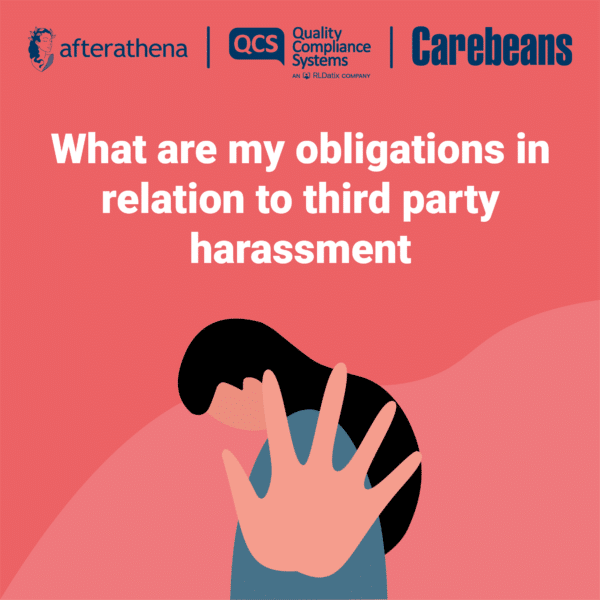On 26 October 2024, new rules came into force, which requires employers to take ‘reasonable steps’ to prevent sexual harassment of their employees during their employment (the preventative duty). Where sexual harassment occurs and the preventative duty is breached, tribunals can uplift the employee’s compensation by up to 25% and the Equality and Human Rights Commission (EHRC) has the power to investigate and take enforcement action.
What’s important to note is that EHRC guidance confirms that the preventative duty extends to protecting employees from sexual harassment by third parties.
The EHRC considers that third parties could include, for example, “customers, clients, self-employed contractors or freelancers, service users, patients, students, friends and family of colleagues, delegates at a conference and members of the public”.
However, employees cannot currently bring claims against their employer where third party harassment occurs.
When introducing the preventative duty, the previous government had intended that employers would be required to take ‘all reasonable steps’ to prevent sexual harassment of their employees. However, this was watered down as the legislation passed through parliament.
Employment Rights Bill
You may have seen in the news that the Employment Rights Bill (ERB), which was announced by the Government at the end of last year, would amend the existing legislation and require employers to take “all reasonable steps” to prevent sexual harassment.
The ERB also proposes that employers would be under a duty to take all reasonable steps to prevent third-party harassment in relation to the relevant protected characteristics under the Equality Act 2010, such as disability, age, gender etc.
Employees would also be entitled to bring claims against their employer in relation to third party harassment – they will only need to show that the third party harassment took place during their employment, and that their employer failed to take all reasonable steps to prevent the harassment.
Therefore, for employers operating in the care sector, with their staff frequently meeting third parties, such as service users and their families, the duty to take all reasonable steps to prevent third-party harassment will be tough to meet. Despite employers have far less control over the actions of third parties than they have over employees, it is possible that any finding of third-party harassment would mean that the employer has failed in its duty to take all reasonable steps to prevent it.
Of course, the ERB is still making its way through parliament – it has not been passed into law as yet.
How can I prevent third party harassment?
- Policy: Implement a clear anti-harassment policy that covers third-party harassment by service users, family members, contractors, or others not employed by the business
- Training: Ensure that your managers and colleagues are trained on how to identify, report, and handle third-party harassment. It’s also important that managers understand the preventative duty and the obligations on the business to prevent harassment. This will help to create a supportive work environment where employees feel safe raising concerns about third-party harassment
- Zero-Tolerance Approach: Adopt a zero-tolerance approach towards third-party harassment and make it clear that action will be taken if employees are subjected to inappropriate behaviour. Posters would be helpful in a care home setting to make this approach clear
- Reporting: Establish a simple, confidential reporting systems for employees to report harassment from third parties
- Swift Investigation and Response: Ensure all reports of third-party harassment are promptly investigated, with appropriate actions taken, including restricting or ending business relationships with offenders
- Risk Assessments: Conduct risk assessments to spot the potential for third-party harassment and implement/adjust your preventive measures accordingly. Risk assessments should be reviewed regularly
If you have any questions in relation to the preventative duty or third party harassment, please do not hesitate to contact a member of the AfterAthena team (part of the Napthens Group) who are able to offer 30 minutes of free advice to QCS members.
Contact AfterAthena







